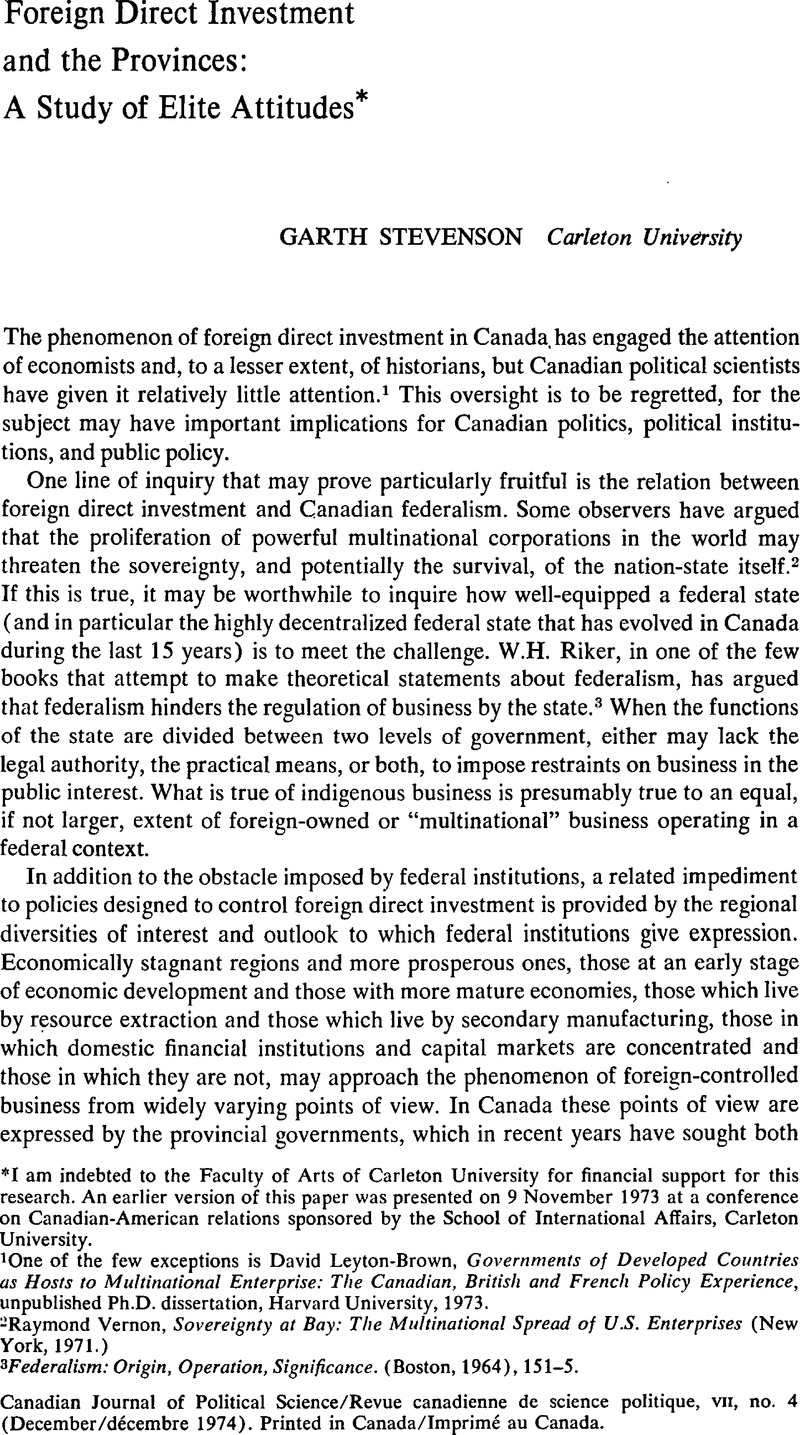Article contents
Foreign Direct Investment and the Provinces: A Study of Elite Attitudes*
Published online by Cambridge University Press: 10 November 2009
Abstract

- Type
- Articles
- Information
- Canadian Journal of Political Science/Revue canadienne de science politique , Volume 7 , Issue 4 , December 1974 , pp. 630 - 647
- Copyright
- Copyright © Canadian Political Science Association (l'Association canadienne de science politique) and/et la Société québécoise de science politique 1974
References
1 One of the few exceptions is Leyton-Brown, David, Governments of Developed Countries as Hosts to Multinational Enterprise: The Canadian, British and French Policy Experience, unpublished Ph.D. dissertation, Harvard University, 1973.Google Scholar
2 Vernon, Raymond, Sovereignty at Bay: The Multinational Spread of U.S. Enterprises (New York, 1971.)Google Scholar
3 Federalism: Origin, Operation, Significance. (Boston, 1964), 151–5.
4 American Capital and Canadian Resources (Cambridge, Mass., 1961), 174–9.
5 Beigie, , “Foreign Investment in Canada: The Shading is Gray,” Columbia Journal of World Business, 7, No. 6 (Nov.-Dec. 1972), 23–32Google Scholar, esp. 30, and Fayerweather, , Foreign Investment in Canada (Toronto, 1974), 76–8.Google Scholar
6 “American Direct Investment and Canada's Two Nationalisms,” in The Influence of the United States on Canadian Development, ed. Preston, R. (Durham, NC, 1972,) 124–43.Google Scholar
7 Foreign Investment in Canada, 58.
8 For the views of former premier Robarts see his opening statement in Canada, Privy Council Office, Federal-Provincial Conference, 19–22 July 1965, esp. 25, 28.
9 Karpan, Robin, “Canada's Foreign Review Bill: A Check to Integration?,” unpublished research paper, Carleton University, 1974.Google Scholar
10 The two Parti Québécois and two Union Nationale respondents were excluded from the analysis of interparty differences.
11 Foreign Investment in Canada, 50–1.
12 See, for example, the Canadian Institute of Public Opinion Gallup Poll reports for 18 May 1968 and 14 October 1970.
13 The view of English-Canadian nationalism as a middle-class phenomenon is expressed by Meisel, John, “Cancel Out and Pass On: A View of Canada's Present Options,” in One Country or Two, ed. Burns, R.M. (Montreal, 1971,) 139–67CrossRefGoogle Scholar, esp. 154. A more extended interpretation of the middle-class basis of Quebec nationalism is found in Taylor, Charles, “Nationalism and the Political Intelligentsia: A Case Study,” Queen's Quarterly, 72, No. 1 (Spring 1965), 150–68.Google Scholar
14 See, for instance, Stevenson, Garth, “Continental Integration and Canadian Unity” in Axline, A. et al., Continental Community? Independence and Integration in North America (Toronto, 1974), 194–217.CrossRefGoogle Scholar
15 The Developing Canadian Community (2nd edition, Toronto, 1968), 189.
16 Claude Masson, “Economic Relations Between Quebec, Canada and the United States,” in Axline, Continental Community, 240–9.
17 Schwartz, Mildred, Politics and Territory: The Sociology of Regional Persistence in Canada (Montreal, 1974).CrossRefGoogle Scholar See also Johnstone, John C., Young People's Images of Canadian Society (Ottawa, 1969).Google Scholar
18 Canada in Question: Federalism in the Seventies (Toronto, 1972,) 75–101.
19 The political attitudes characteristic of a resource frontier are discussed in Robin, Martin, “British Columbia: The Politics of Class Conflict” in Canadian Provincial Politics, ed. Robin, (Scarborough, 1972) 27–68.Google Scholar
20 The same argument is presented in government of Saskatchewan, brief to the House of Commons Standing Committee on Finance, Trade and Economic Affairs regarding Bill c-132 (1973), 2.
21 Prince Edward Island's legislation to prevent the sale of land to non-residents of Canada was ruled ultra vires by the courts. At the time of writing the provincial government was appealing the decision to the Supreme Court of Canada.
- 2
- Cited by




